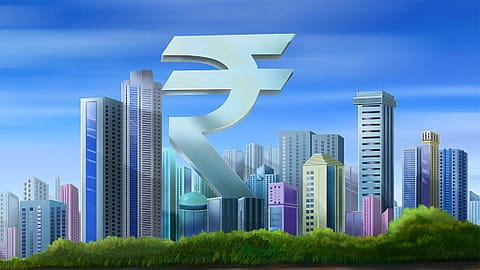India to be among fastest growing economies with 7.7% growth in 2023: KPMG
Inflation will come down from 6.2% in 2021 to 5.4% in 2022 and 4.5% in 2023, says KPMG.

Though geopolitical tensions and shortage of raw materials pose major risks to growth for India, the country will remain among the fastest-growing economies in 2022 with 9.2% growth this year and 7.7% growth in 2023 as investments in infrastructure and manufacturing sectors will accelerate job creation, predicts KPMG's Global Economic Outlook.
The agency also says inflation will come down from 6.2% in 2021 to 5.4% in 2022 and 4.5% in 2023. Unemployment rate is likely to be slightly lower, from 10.1% in 2021 to 9.2% in 2022 and 9.1% in 2023.
"Continuous uptick in High Frequency Indicators (HFIs) and GDP growth figures for the last two-quarters point towards economic recovery in India. Also, the Government's impetus on infrastructure development and domestic manufacturing is anticipated to further this growth, create more jobs and help build supply chain resilience," said Preeti Sitaram, director of Government & Public Services at KPMG in India. However, turbulence in crude oil and commodity prices owing to the current geopolitical uncertainties is leading to high input prices for industries and supply chain disruptions which may pose a threat to the economic growth plans of the country in the short-term, she added.
On the back of rapid vaccination programme roll-out and government support, India contained the impact of the Covid-19 third wave, while also pursuing the objective of economic recovery. Subsequent upticks across a range of indicators, including the mobility index, direct tax collections, and electricity demand, reflect positive levels of economic growth. Private consumption is still trailing behind pre-pandemic levels, factors such as the opening up of mobility, growing consumer confidence, and high-capacity industrial utilisation, all point towards economic recovery. An increase in capital expenditure targets by the government and investments in the Infrastructure and manufacturing sector are expected to reduce the unemployment rate, which stood at a six-month high of 8.1% in February 2022, said KPMG.
It said, however, the retail inflation has been increasing steadily since September 2021 and stood at 6.07% in February 2022, owing to increasing oil prices, rising input costs and supply chain disruptions. Other issues such as semiconductor chip shortage and high commodity prices also pose challenges to the growth of the industrial sector. recent geopolitical developments are hurting domestic stock indices and creating volatility in crude oil prices and exchange rates. Given India's import dependence on crude oil, natural gas, and other commodities, a spike in inflation and in the current account deficit are aspects to be watched, particularly given the evolving geopolitical situation. Furthermore, uncertainty about the fourth wave and virus mutations pose a significant risk for future growth of the Indian economy, said the outlook.